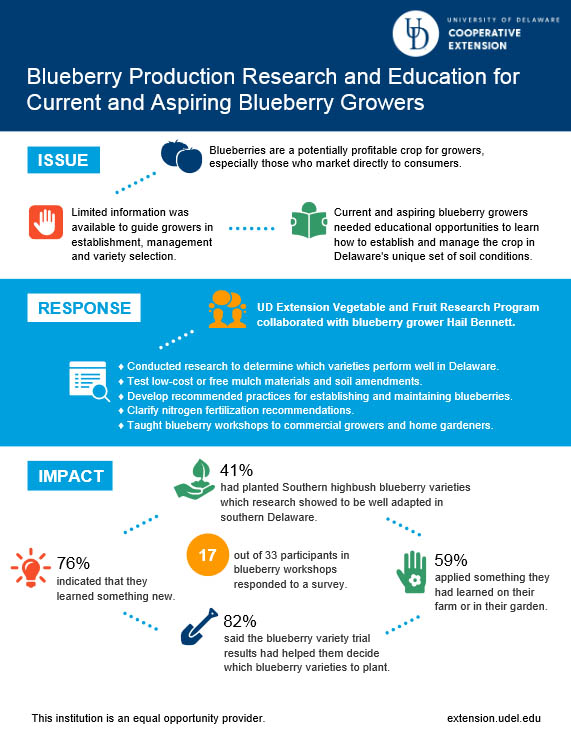
Blueberry Production Research and Education

ISSUE
Blueberries are a potentially profitable crop for growers, especially those who market directly to consumers. Interested farmers consulted Extension for advice on growing as well as variety recommendations. However, limited information was available to guide growers in establishment, management and variety selection for blueberries in Delaware’s soils and climate. Plants require a unique set of soil conditions, which can make blueberries difficult to grow. Current and aspiring blueberry growers needed educational opportunities to learn how to establish and manage the crop.
RESPONSE
The UD Extension Vegetable and Fruit Research Program collaborated with blueberry grower Hail Bennett to conduct research to determine which varieties perform well in Delaware, test low-cost or free mulch materials and soil amendments, develop recommended practices for establishing and maintaining blueberries and clarify nitrogen fertilization recommendations. An interesting result is that some Southern highbush blueberry varieties, which are more tolerant of heat and variable soil conditions but not necessarily cold hard, are well adapted in southern Delaware.
IMPACT
In October 2018, 33 past participants in blueberry workshops were emailed or mailed a survey with 17 responses. Eight respondents are commercial blueberry growers, seven are home gardeners with blueberries and two are interested in blueberries, but not currently growing. Participants were asked about knowledge gained or adopted related to blueberry pruning, plant establishment, soil amendments, mulch materials, and choosing varieties.
- 76% of participants indicated that they learned something new
- 59% or more of the participants applied something they had learned about each of these topics on their farm or in their garden
- 82% of respondents said that the blueberry variety trial results had helped them decide which blueberry varieties to plant
- 41% had planted Southern Highbush blueberry varieties
- All respondents who attended a field day to see plants in the variety trial and taste berries from the different varieties said that experience helped them decide which varieties to plant
Recognition of Supporters: Delaware Department of Agriculture supported this work through a Specialty Crop Block Grant.
